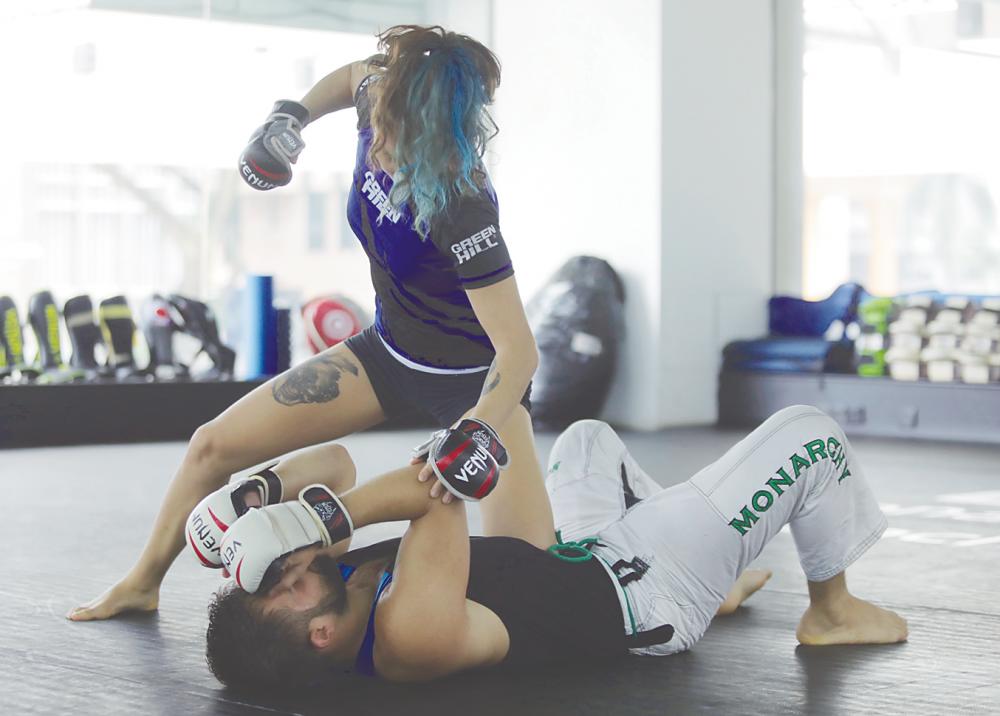COMING from a family of sport enthusiasts, Colleen Augustin was introduced to various martial arts ever since she was a child, before eventually settling on Mixed Martial Arts (MMA).
All of her efforts in the sport have finally paid off, as the 21-year-old Penangite recently became the first Malaysian to win the IMMAF–WMMA Asian Open Championship 2019 in the strawweight division.
Her feat has propelled her onto the world stage, and she will next be competing at the IMMAF World Championship in Bahrain this November.
What does it mean to be a fighter?
“It means a lot to me. It is putting in the hard work, and sometimes there’re certain things that you need to do so that it benefits your sport, even you might not like it.
“It also teaches me how to be disciplined and committed. You can be the best, but if you don’t have the passion, you’ll eventually give up.
“To be a fighter, the sport also tests how long you could last. If you genuinely love it, you would do a lot for it, but if you don’t love it then you’re essentially putting yourself in danger because you’re entering the ring where you have a chance of getting hurt, knocked out, or even paralysed and die.”
What is the best thing about MMA?
“
I’d say that you get a lot of options when you fight. Because when you do Muay Thai, the minute you’re struck and touch the ground, the fight stops. That being said, it [varies] individually, some fighters prefer striking, like my brother who is a Muay Thai fighter, and [Jiu-Jitsu] fighters practise Jiu-Jitsu because they prefer grappling.
“I love MMA because it encompasses everything, and I get to use all the different techniques to my advantage and switch them at different instances.
“I’d say my style is heavily grappling-based, though I’m still figuring out which style I’m good at, and which suits me best.”
How was the journey to winning Malaysia’s first gold at the IMMAF-WMMA Asian Open Championship 2019?
“It was quite ‘last minute’, because I was told three weeks prior to the championship that I was representing Malaysia, but it worked out well for me since I started training again for a different tournament in January after recovering from my injury.
“Both tournaments happened around the same timeframe, but I decided to go for the WMMA Asian Open instead.
“It was such an amazing experience to be able to achieve what I set out to reach.”
How did you get injured?
“It was my worst injury. Last year I was in my wrestling class doing sprawl drills and I sprawled wrongly, where I accidentally hit my knee on the mat. Instead of resting for one week, I kept on training, because I had my first MMA fight coming up.
“So throughout last year, my knee got worse and worse, then it got better, and worse again from the inflammation.
“For two months, I couldn’t train and all I did was yoga, swimming and [lifting] weights. In January this year, I got a PRP (Platelet-Rich Plasma) injection and it hasn’t hurt since.”
Do you fight better when you’re aggressive?
“I have a switch ... [to help me] get myself into the state of mind when I’m in the ring. I’ve been told that I’m an aggressive fighter, meaning I tend to push forward a lot, but I don’t fight aggressively with emotions.
“If I fight with emotions, I’m worse; if I fight calmly and just go with the flow, I’ll fight better. Everyone is different.”
Do you think there is a lack of gender representation in the field?
“I wouldn’t really say that. I do see MMA as one of the sports where women actually get opportunities to perform and thrive.
There are always people constantly searching for female fighters, and opportunities for women to even become fighters, it’s just a matter of if they want to pick up the sport or not, because it’s not an easy one.”
Any advice someone has given you and you think should be passed on?
“My parents used to tell me: ‘Everything is possible.’
“Since I was a kid, whenever I wanted to do any sport, even if it’s not conventional for women by society’s standard, my parents have never once said ‘No’ to me, instead they said: ‘Go ahead and try it out’.
“I’m very blessed by them, they’ve always been so supportive of me.”










